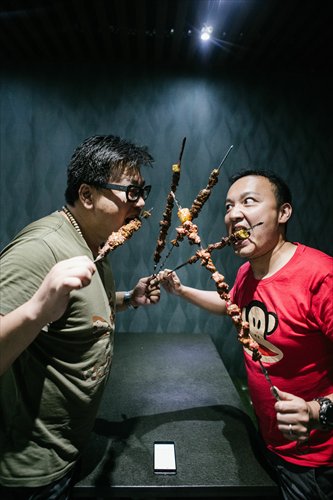HOME >> METRO BEIJING
Champion eaters
By Yin Lu Source:Global Times Published: 2015-7-9 17:33:01
Competitive eating takes hard work and training

Eating competitions both at home and abroad have captured people's interest. Photo: Li Hao/GT
Word of a newly-crowned American eating champion gulping down 62 hot dogs within 10 minutes has become a hot topic on the Internet in China in recent days.
Matt Stonie, 23, who weighs 130 pounds, won the championship belt and the $10,000 prize on Saturday at the annual 4th of July Nathan's Hot Dog Eating Contest in New York. "How come I don't have this kind of appetite?" read one post. Other Chinese Net users said: "How can I enter a contest like this in China?" and "He can't be all alive and kicking afterward."
But this is not about fun and games for this full-time competitive eater. "I just came in more prepared and better trained than I did last year," Stonie told Metropolitan.
He said being a competitive eater requires lots of training as well as thorough preparation. "We train our throat muscles, stomach muscles and abdominals to help eat the food as fast as possible and to be able to hold so much food down."
Competitive eating, in which participants compete against each other to eat large amounts of food in a short period of time, is mostly popular in the US, Japan and Canada where contests are held and there is a large follower base. In recent years, it has also been introduced in China, with a number of small-scale competitions or themed television shows drawing increasing attention and media coverage.
More than just eating
Stonie first realized he could be a successful competitive eater in college, when he randomly signed up for a lobster roll eating contest with $1000 on the line. And he won, to his surprise.
Nicknamed the "Megatoad," Stonie ranks second among the world's top competitive eaters as listed by Major League Eating (MLE), an organization that sanctions professional competitive eating events. His records include 182 strips of bacon in five minutes, and 14.5 pounds of cake in eight minutes.
"A lot of people have the misconception that competitive eaters are big, 500-pound guys who just eat all day. We're not. We're trained athletes," said Stonie. He eats moderate portions when he's not competing.
Many might find it surprising that most competitive eaters are lean, but Stonie said competitive eating is not as simple as just having a meal.
For him, training is "a gradual process that is achieved just by repetition and pushing limits." He practices to swallow by chewing less. He also trains his throat and stomach muscles so he can "push the food down to the lower parts of the stomach."
For most people, competitive eating is something between a sport and a form of entertainment, but knowing firsthand what it's like to be a competitive eater, Stonie considers it a sport. "When we're up on stage, we're sprinting, forcing our body to work in ways that normal people wouldn't be able to, and by the end we're exhausted."
Competitive eating has seen a huge surge in interest on social media.
Stonie's YouTube channel for example, has more than 666,000 subscribers. Many of the videos of him gulping down food on that channel have been viewed more than two million times.
More than 100,000 eating videos can be found on the website. Meanwhile, China's video-sharing websites like youku.com also contain popular videos of competitive eating contests both from China and abroad.
Stonie thinks it's because people find pleasure in indulging and testing themselves, as well as in watching others eat. "It's truly something everyone can relate to."

Competitive eaters try to eat as much as they can in the shortest period of time. Photo: Li Hao/GT
China's big stomach
MLE conducts around 80 events annually, including the 4th of July hot dog eating contest that has been running for 42 years. It has hosted competitions in China over the last few years, and wants to do more in future.
Traditional eating contests usually involve pies, hamburgers or hot dogs, but in China, the games often involve more localized food choices.
Pan Yizhong from Changsha, Hunan Province has been given the nickname "Big Stomach of Hunan" by enthusiasts and the media. Pan, now in his 50s, has had a good appetite ever since childhood. "All my family members can eat a lot. Maybe it's genetic."
Pan, who weighs 76 kilograms, once dispatched of three kilograms of noodles in one sitting, and 36 rice dumplings in another. His most recent attempt was eating 33 chicken eggs in 22 minutes to commemorate the third day of the third lunar month.
Pan especially takes great pride in having eaten a 1-meter-diameter pizza in Beijing last June. "I thought it was an impossible mission when I saw the size of the pizza, but I still managed to finish it," Pan said.
His next goal is to eat moon cakes, a traditional food had by Chinese people on the occasion of the Mid-Autumn Festival, and to get into the Guinness Book of World Records.
Training to eat
Pan said he often doesn't eat for 24 hours before a contest. "When you reach a certain point, you can eat anything." But it seems neither starving nor gluttony has brought him any discomfort.
Examined by doctors during one TV program, Pan was told that his stomach has an extra strong gastric emptying ability, which allows him to digest food faster than the average person.
Besides daily exercise such as swimming, jogging and dancing, he also takes on other extreme challenges that require great strength and endurance, such as swimming 45 kilometers in one day, or trying to stay buried up to his neck in snow for half an hour.
In the women's 4th of July hot dog competition in the US on Saturday, Miki Sudo defended her title with 38 hot dogs. Currently ranked fourth on MLE's world's best eaters list, and the top woman, Sudo is known not only for her ability to eat so much, but for her small figure, weighing only 120 pounds at 1.7 meters tall.
For Sudo, winning a contest requires her to bring together 100 percent of her "capacity, speed, technique and coordination."
On top of developing her own pace and rhythm, winning can be attributed to the physical training she does every day, said the 29-year-old who works in marketing in Las Vegas.
"Personally, I perform better when I weigh less," she said. According to her doctor, participating in contests hasn't affected Sudo's health, but instead, motivates her to get even fitter.
"I'm watching what I eat, and I'm very conscious of my diet," she said.
Although after a contest, she usually feels tired due to the large amount of sodium she has consumed, she feels fine again after two days.
Stonie also said he feels "winded" after a contest and it might take two days to fully digest the food. However, Stonie's doctors find him to be healthier than most other patients.
"I can't stress enough how competitive eating has made me healthier," Sudo said.
Bad for your health?
Despite competitive eaters claiming to lead a healthier lifestyle motivated by their sport, and feeling little discomfort after a big contest, some experts warn that this kind of binge eating can have serious repercussions in the longer term.
The American Dietetic Association is quoted on the medical website WebMD as saying that competitive eating can send a message to spectators that overeating is not a big deal.
Research carried out by gastrointestinal radiologists at the University of Pennsylvania and published in the American Journal of Roentgenology in 2007, compared the stomachs of world-class speed-eating champions and that of an average person.
They found that the stomach of a competitive eater expands to form an enormous flaccid sac, capable of accommodating huge amounts of food. They concluded that competitive eating might be potentially self-destructive. It's possible that the eaters may eventually become morbidly obese, and could suffer from profound gastroparesis (a condition in which the stomach can't empty food properly), intractable nausea and vomiting, and might even need a gastrectomy.
Learning from the best
Besides regulating eating methods and safety standards, MLE recommends people get involved in sanctioned events, but strongly opposes home training of any kind, or young individuals trying it.
However, professional eaters say the average person can still learn a thing or two from them. For those who want to get their money's worth at a buffet, Stonie's advice as a pro is to go for the most expensive food, because it is usually high in protein, instead of filling up on fat which will mentally make people feel full.
Sudo concludes that excessive exercise and a disciplined diet is what keeps professional eaters thin and fit. She encourages people to consider giving eating competitions a try, but to be aware that it's often more of a gift one happens to have rather than something one can practice or learn. Her family members also have a comparatively big appetite, but they don't have the same speed and coordination to eat large volumes.
"The most important part is to enjoy yourself," Stonie said. "I love what I do as a competitive eater and that's what's pushed me so far to achieve what I have."
Fu Xiaotong and Chen Haonan contributed to this story
Posted in: Metro Beijing